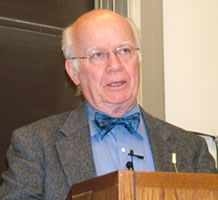The Hard Line and All the Other Lines in Religion: Globally and Domestically
Martin E. Marty
Tuesday, February 28, 2006, Woodburn Hall 120

Around the world, contrary to Enlightenment-era expectations that religion would disappear or that surviving religions would be soft-line, reasonable, and tolerant, religion is back in full force. And much of the energy is along the "hard line" in all the religions. This lecture will include report on the trends, attempts to account for them, and some envisionings of strategies for the future.
Martin E. Marty is The Fairfax M. Cone Distinguished Service Professor Emeritus of Religious History at the University of Chicago. He is one of the most prominent scholars of Modern Christianity and interpreters of religion and its role in American political and social life. Before joining the Chicago faculty, he served as a Lutheran pastor. He taught in the Divinity School for thirty five years and was the first Director of the Institute for the Advanced Study of Religion, which opened in October of 1979. In 1998, the Institute was renamed the Martin Marty Center in his honor. He was awarded the National Humanities Medal, the Medal of the American Academy of Arts and Sciences, and fifty nine honorary doctorates. Marty is author of more than fifty books, among them Righteous Empire (winner of the National Book Award); the three-volumes of Modern American Religion; The One and the Many: America’s Search for the Common Good; Places Along the Way; Our Hope for Years to Come; The Promise of Winter; and most recently The Promise of Grace, The Protestant Voice in American Pluralism and Martin Luther (part of the “Penguin Lives” series). In addition to books, he has written more than 5,000 articles, essays, papers, chapters, and forewords. He has served as president of the American Academy of Religion, the American Society of Church History, and the American Catholic Historical Association.
Tuesday, October 10, 2006, Fine Arts Auditorium
Angelo Pizzo explores the challenges, battles, and tricks involved in bringing a movie idea to its final destination: the big screen. He will also describe the role of luck, talent, and persistence in the process.
Angelo Pizzo is an accomplished screenwriter and film producer. He grew up in Bloomington, where he graduated from Indiana University in 1971 with a B.A. in Political Science. He then attended film school at the University of Southern California. After beginning his career at Warner Brothers Television, he moved to Time Life Films where he eventually became vice president for feature film production. His biggest success came in 1987 with the film Hoosiers (nominated for two Academy Awards), which he wrote and co-produced. The film is now in the Library of Congress' National Film Registry and has been declared by ESPN and USA Today the best sports film of all time. In 1993, Pizzo wrote and co-produced another successful film, Rudy. Both films were directed by his college roommate and close friend, David Anspaugh. Pizzo and Anspaugh also collaborated on their third film, The Game of Their Lives, released theatrically in 2005.
Saturday, October 14, 2006, State Room East, Indiana Memorial Union

In the middle of the twentieth century, changes began to occur in the way the law treated sexual minorities in many countries. One of the most important stimuli was the work of Alfred Kinsey at Indiana University. His path-breaking empirical investigation into the varieties of human sexuality made it impossible and unjust to demand only heterosexual expression. This gradual realization has revolutionized criminal law, family law, and other laws in many countries, including the United States and Australia. In this lecture, Justice Michael Kirby reviews some of the relevant changes that have occurred in international and domestic law. His lecture includes a reflection on Kinsey and his impact in Australia in the 1950s.
Justics Kirby received his Bachelor of Economics, Bachelor of Arts, and Master of Law degrees from the University of Sydney. From 1983 to 1984, he was a judge in the Federal Court of Australia and the youngest person ever appointed as a Federal Judge. He was then appointed President of the New South Wales Court of Appeal, the highest court in that state's legal system. In February of 1996, he was appointed to the High Court of Australia and has served on it ever since. He received Australia’s highest honor in 1991, when he was made a Companion of the Order of Australia (AC). He is also a Companion of the Order of St. Michael and St. George (CMG).
In the 1990s, Justice Kirby acted as Special Representative of the Secretary-General of the United Nations for Human Rights in Cambodia and served on many other UN bodies. Justice Kirby is currently a member of the International Bioethics Committee of UNESCO, the Ethics Committee of the Human Genome Organisation, and the Global Panel on Human Rights of UNAIDS (the Joint United Nations Programme on HIV/AIDS). He was among the founders of Australians for Constitutional Monarchy, an organization which played a prominent part in the "No Republic" campaign during the lead-up to Australia’s 1999 republic referendum. Earlier this year, Justice Kirby received the 2006 NSW (New South Wales) Australian of the Year Award.